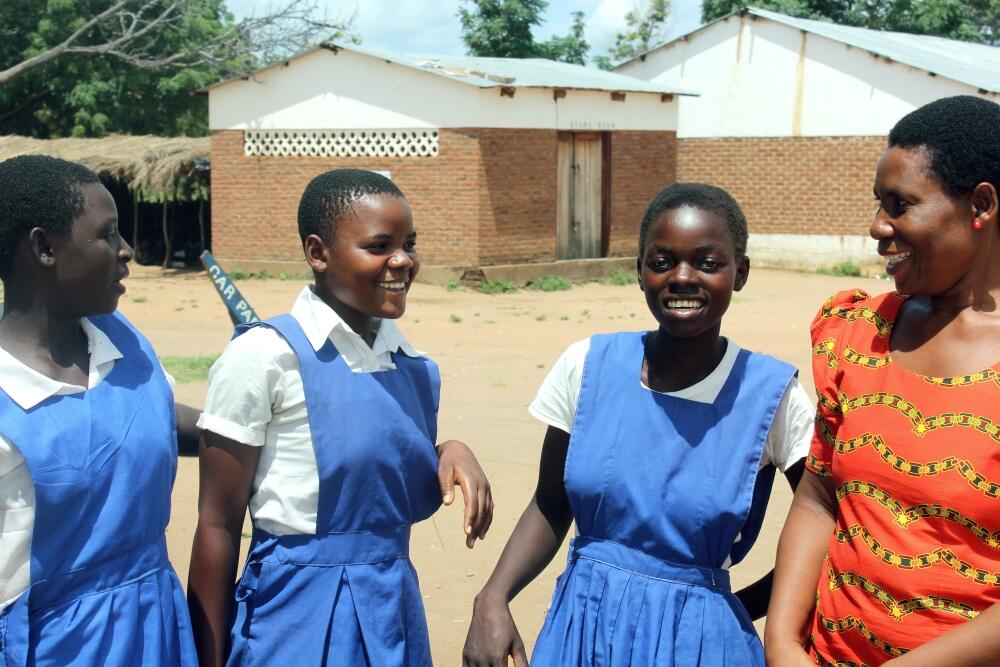SALIMA DISTRICT, Malawi – Fridays are special for any child at school as they herald the advance of the weekend – more time for play. But for girls at Lifidzi Primary School, Fridays have special meaning.
It is when lessons have finished for the day that they gather together at the school for a particularly empowering purpose. They make sanitary pads using locally available materials. And while they are busy with this task, they are provided with information on sexual and reproductive health, including where to access services.
It’s a simple intervention with potentially enormous implications.
The pad-making initiative aims to ensure that girls attend classes even when they are menstruating. All too commonly, in many rural schools girls stay at home while menstruating because they cannot afford modern, hygienic pads to keep themselves clean and comfortable.
Each day of classes they miss each month, their performance at school is compromised and in turn, their ability to complete their schooling successfully. This affects their job prospects and their ability to support their future families. In the long run, it diminishes the economy of their communities and reinforces a cycle of poverty.
But since the initiative began, the situation is changing for these girls. They are now able to attend classes comfortably – right throughout the month. It may seem a small step but the significance cannot be overstated.
There is a special room here at school, arranged for us girls, where we (can) go and change the pads comfortably.
At Lifidzi Primary, girls have been provided with a space of their own, which is known only to the girls themselves and their teachers.
“There is a special room here at school, arranged for us girls, where we (can) go and change the pads comfortably,” says Naomi Maulana, who is in Standard 7.
Widening reach to out-of-school girls

While the initiative targets school-going girls, the need for pads is a wider problem. Girls who are already out of school lack sanitary pads too, and this need has been recognized.
Through interaction, the girls are transferring their pad-making skills to out-of-school girls. One of the scholars, Mercy Dyson, has been teaching her new-found skills to her friends in her village, Mzembera.
“These are my friends. I play with them when I leave school every day and I have helped them to take care of themselves whenever they are menstruating. They are now able to make their own pads,” she says.
It is always difficult to manage this situation when you don’t have money.
Mercy and a friend, Evarista Daniel, both 16 years old, have taught nine girls in their respective communities how to sew pads.
“It is always difficult to manage this situation when you don’t have money, therefore, helping our friends is (a) good gesture and it makes them appreciate the importance of school,” says Mercy.
The pad-making initiative is popular among girls ranging from standards 5 to 8 at Lifidzi Primary, and in many other schools that UNFPA, the United Nations Population Fund, has supported in Malawi.
Attendance at primary school level is high. About 96 per cent of girls and 90 per cent of boys were enrolled in 2015. At secondary school level, however, the picture changes drastically: just 33 per cent of girls and boys were enrolled in 2015 (World Population Dashboard).
The situation has improved tremendously. We provide four to six pads per girl and this has helped maintain their dignity when they menstruate at school.
Drop in school absenteeism among girls
Jean Zangazanga coordinates the initiative in Salima District. She has witnessed a significant drop in absenteeism among girls in several schools that she monitors, including Lifidzi Primary.
“The situation has improved tremendously. We provide four to six pads per girl and this has helped maintain their dignity when they menstruate at school. We also keep some (pads) at school for emergencies, especially to help those who do not have pads handy,” she says.
The spill-over of this skill to out-of-school girls is a reflection of how convenient the re-usable pads are. Since the initiative started almost three years ago, 64 girls have been trained at school in how to make sanitary pads and many girls benefit from using them.
UN JPGE links girls with sexual and reproductive health information and services
The pad-making skills are being provided to girls in school by UNFPA Malawi, with support from the Norwegian Government under the UN Joint Programme on Girls Education (JPGE), through the Malawi Girl Guides Association (MAGGA).
The JPGE programme has successfully linked school-going girls with sexual and reproductive health information and services.
Girls are also provided with comprehensive sexuality education through a network of mothers’ groups in the district. The girls are then linked up with youth-friendly health services that are deliberately positioned to help those who are in need of information and services.
“The JPGE programme has successfully linked school-going girls with sexual and reproductive health information and services, and this is the main focus of our programme,” says Cecilia Chinula, Youth Programmes Specialist at UNFPA Malawi.
The programme aims to ensure the provision of quality, integrated youth-friendly services, resources and structures for girls who are both in and out of school. These include comprehensive sexuality education, and information and services on sexual and reproductive health and reproductive rights, HIV and AIDS, and gender-based violence.
By Henry Chimbali




